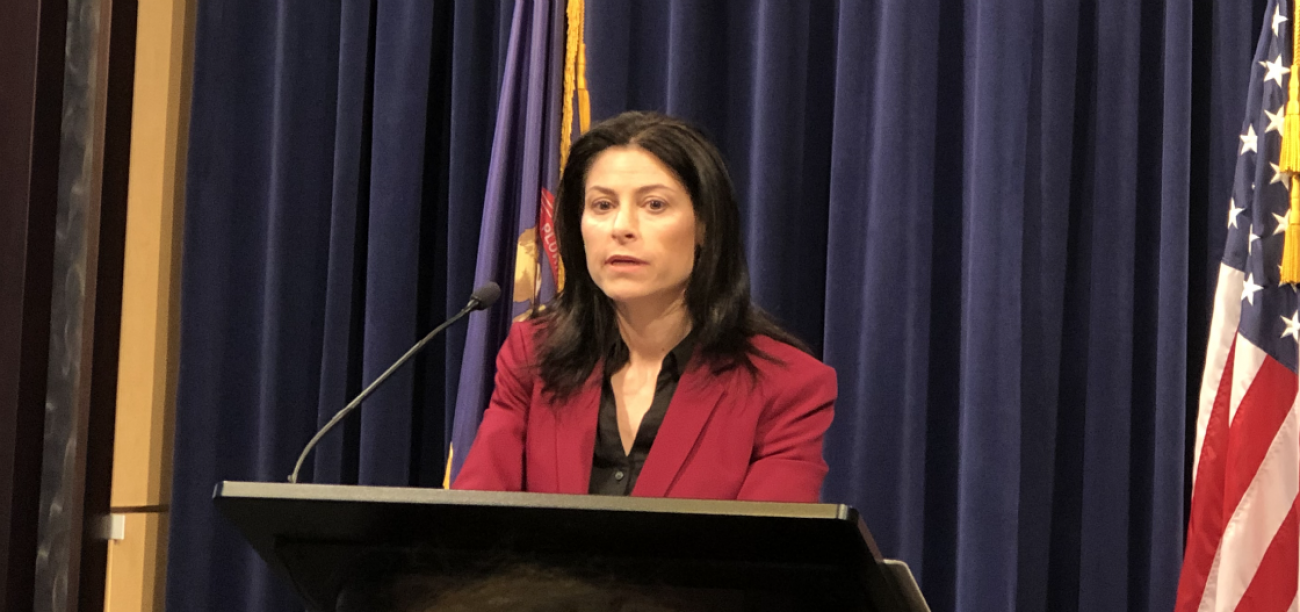Dana Nessel sues 3M, DuPont over ‘unconscionable’ PFAS pollution in Michigan

LANSING — Michigan is suing some of the biggest chemical manufacturers in the nation in an effort to recoup past and future cleanup costs for PFAS contamination that threaten groundwater and drinking water systems.
Attorney General Dana Nessel filed a sweeping lawsuit Tuesday in Washtenaw County Circuit Court, alleging 3M, DuPont and other PFAS manufacturers “intentionally hid” known health and environmental risks from the public and state while selling toxic but profitable “forever chemicals” to consumers and corporate customers since the 1950s.
The state is “committed to ensuring that the companies responsible for unleashing PFAS onto our state will stand up to their obligations and their responsibilities,” Nessel said during a press conference, calling decades of alleged inaction by the companies “beyond unconscionable.”
“Despite their knowledge of the potential dangers of PFAS, they deliberately, intentionally conceal these dangers from government entities, including the state of Michigan and the public at large, to protect their profits and avoid public responsibility,” she said.
More articles on PFAS in Michigan:
- Michigan’s PFAS cleanup costs are mounting. Taxpayers may get stuck with the tab.
- In a Michigan town with a toxic legacy, residents fought for decades to heal
- Poisoned Michigan: How weak laws and ignored history enabled PFAS crisis
- Michigan found PFAS in Oscoda in 2010. There’s still no plan to clean it up.
- Opinion | PFAS has poisoned my town. Government needs to step up and help
The suit seeks to hold 17 named companies financially responsible for all past and future costs associated with toxic per- and polyfluoroalkyl contamination at dozens of sites across the state. Spokespersons for 3M and DuPont, the largest firms, disputed the state claims.
PFAS chemicals, used in non-stick, waterproof products such as Teflon, are linked to cancer and were used at as many as 11,300 Michigan fire stations, landfills, industrial sites, military bases, airports and other locations, according to state estimates.
The lawsuit proposes payments for environmental remediation, alternative water supply connections and health assessments for residents exposed to the chemicals.
Michigan is the latest in a small but growing number of states to sue PFAS manufacturers including 3M, a Minnesota based conglomerate that in 2018 reached an $850 million settlement with its home state over damages caused by perfluorochemical disposal in the Minneapolis-St. Paul metropolitan area. New York sued 3M and Dupont in November following similar suits by New Jersey, New Hampshire and Vermont.
PFAS contamination is a national issue, but Nessel said that she hopes that being one of the “first in” will provide a “better opportunity for recovery” by the state.
“This is not going to be inexpensive,” she said of potential damages.
The Michigan complaint comes 18 months after former Gov. Rick Snyder asked former Attorney General Bill Schuette to take “immediate” legal action against 3M “and all other” parties responsible for PFAS contamination that has saddled the state with growing cleanup costs.
Schuette never took action. Instead, shortly before leaving office, he sent Snyder a late 2018 letter suggesting he did not file a lawsuit because he’d never received authorization from the Department of Environmental Quality.
Former DEQ Director Heidi Grether later called that a “pretty bogus” explanation by Schuette, who was running for governor at the time.
It took Nessel more than a year in office to file a suit of her own.
The first-term Democrat said in October that she had hired an outside legal team — attorneys from Fields PLLC in Washington D.C., Keating, Meuthing & Klekamp PLL in Cincinnati and DiCello Levitt Gutzler LLC of Chicago — to develop PFAS litigation.
The firms would make between 10 percent and 20 percent of any money awarded to the state.
Nessel announced the civil lawsuit alongside Gov. Gretchen Whitmer, former Attorney General Frank Kelly and Liesl Clark, director of the Michigan Department of Environment, Great Lakes, and Energy.
“Companies that are responsible for these contaminants must be held accountable,” Whitmer said. “Polluters must pay. It’s time that these companies step up, take responsibility and address what has taken place.”
Research has linked PFAS compounds to developmental and behavioral problems for infants and children, hormonal and immunity problems as well as certain cancers.
The lawsuit contends manufacturers “have known for decades” that PFAS are toxic and pose serious health and environmental risks. But it alleges they “persistently and intentionally hid this information from Michigan and the public.”
Dan Turner, a spokesman for DuPont, said the company had not yet seen the lawsuit but is “extremely disappointed” the state took legal action “we believe is without merit.”
DuPont does never manufactured firefighting foam, and its use of other PFAS “is a small fraction of the total PFAS used in the world,” he said. The company is committed to remediation and “will vigorously defend our record of safety, health and environmental stewardship.”
Fanna Haile-Selassie, a spokeswoman for 3M, said her company disagrees with Nessel’s allegations.
“We acted responsibly in connection with products containing PFAS and will vigorously defend our record of environmental stewardship,” she said in a statement. “To that end, we have placed thousands of documents in the public domain, including more than 150 published studies conducted by 3M and other researchers on potential environmental and health effects of PFAS. 3M did not and will not distort the science.”
Other named defendants include DuPont spinoffs Chemours and Corteva, Dyneon LLC, Archroma entities, Arkema entities, AGC Chemicals Americas, Daikin Industries, Solvay Specialty Polymers and Asahi Kasei Plastics North America.
Michigan began an aggressive PFAS sampling plan in late 2017 and is now monitoring PFAS-contaminated groundwater at 74 sites in 36 counties.
Testing data have shown at least trace amounts of PFAS in more than 100 public water systems.
“What we’ve learned so far is troubling,” said Clark, director of the state environmental department. “Chemical companies engineered PFAS with incredibly strong carbon fluorine bonds. PFAS does not break down readily in the environment, or biodegrade over time. In fact, they accumulate. They are the forever chemicals.”
Nessel’s complaint identifies 37 sites with known contamination, including a former tannery in Alpena, a former plating facility in Manistee, former General Motors sites in Lansing and industrial property in Detroit at the site of the future Gordie Howe International Bridge with PFAS levels exceeding the federal health advisory level.
The suit was filed in Washtenaw County, where regulators have identified high levels of PFAS at a Ford Motor Co. manufacturing plant in Saline.
3M is based in Minnesota but operates plants across the world, including a manufacturing facility in Detroit that produces products for metal applications, woodworking and finishing, wood floor resurfacing, collision repair and automotive aftermarkets finishing.
According to a company history, 3M launched PFAS-based products in the 1950s, including Scotchgard stain and water repellent. In the 1960s, 3M worked with the U.S. Navy to develop fire-fighting foams that used PFAS. The company announced in 2000 that it would begin to voluntarily phase out PFOA and PFOS products, mostly by 2002.
In his 2018 letter instructing Schuette to sue, Snyder wrote that PFAS in Michigan’s waters “are directly attributable to the products 3M designed, manufactured, marketed and sold since the 1960s,” including Scotchgard and firefighting foams.
“It is generally understood that 3M was aware of the nature of its products and the threats they posed to public health,” Snyder wrote. “Despite this knowledge, 3M continued to manufacture, market and sell its products containing the contaminant without disclosing to its customers and regulatory agencies the threat they posed to the general public.”
See what new members are saying about why they donated to Bridge Michigan:
- “In order for this information to be accurate and unbiased it must be underwritten by its readers, not by special interests.” - Larry S.
- “Not many other media sources report on the topics Bridge does.” - Susan B.
- “Your journalism is outstanding and rare these days.” - Mark S.
If you want to ensure the future of nonpartisan, nonprofit Michigan journalism, please become a member today. You, too, will be asked why you donated and maybe we'll feature your quote next time!




